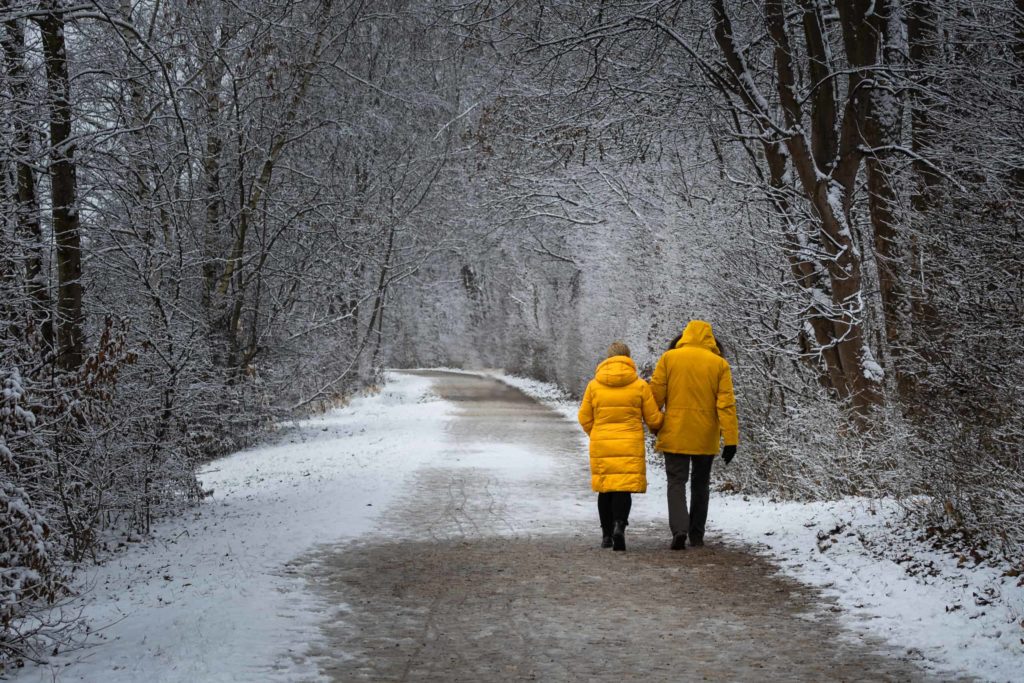You probably live in the Dallas, Texas, area for very good weather-related reasons. With an average annual snowfall of 1.2 inches, Dallas sees about 26 inches less snow than the rest of the U.S. Its 234 days of annual sunshine mean Dallas residents enjoy a full month’s worth of more sunny days than the rest of the U.S., too. But that doesn’t mean Dallas can’t get downright cold in the winter months — which makes it very important for seniors to remember cold weather safety tips when the temps start to drop. We’ve got six cold weather safety tips for older adults to help keep you and other seniors safe in the cold weather this winter season. If you’re an older adult living in Dallas or the surrounding area, you’ll be prepared no matter what Old Man Winter throws at you.
Tip #1: Watch the nightly forecasts in the winter.
You might think that because it’s in a southwestern state, Dallas usually has mild, moderate winters. But in February 2021, arctic air whipped through Texas, causing temperatures to plunge near 5 degrees. The Dallas area stayed below freezing for days and caused massive widespread power failures. Hundreds of people died. So keep an eye on the forecasts — and if cold weather is headed your way, make a cold weather safety plan well before the weather hits. Stay with relatives who have gas- or fire-burning fireplaces that can heat a home even without electricity. If you can, evacuate the area and stay in a hotel outside the cold weather zone. If you’re sheltering in place, be sure to have plenty of warm blankets and clothing, stock up on food, water and essentials, and consider getting a generator.
Tip #2: Avoid the ice. If you can’t avoid it, learn how to walk safely on it.
Falls can be particularly dangerous, even deadly, for older adults. So when we’re talking about cold weather safety for seniors, we have to mention the perils of ice. If you’re out walking in the winter, you may not be able to see patches of ice until it’s too late. A good rule of thumb is always assume that wherever you walk, there’s ice everywhere. Buy a set of traction cleats to put on your shoes — they slip on over any size shoes and they act like tiny little ice picks on the bottom of your feet. If it does snow, remove the snow from your sidewalk and driveway immediately, before it has a chance to pack down and freeze. And possibly one of the best pieces of advice is to walk as a penguin does: Take short, shuffling steps, curl your toes under and walk as flatfooted as possible. Spread your feet out slightly to increase your center of gravity.
Tip #3: Keep drinking — water, not alcohol.
In the winter, it’s very easy to get dehydrated. Cold, dry air contributes to water loss, but the problem is, in the winter we may feel less thirsty than in the warmer months. For older adults, that can easily lead to dehydration. Symptoms include dizziness, infrequent urination and confusion. So keep drinking water, even when it’s cold out. If you get tired of drinking it straight, add slices of cucumber, lemon or orange, or add powdered flavors. If you’re a tea fan, make hot tea with lemon and honey. But don’t drink alcoholic beverages, which can dehydrate you.
Tip #4: Watch out for hypothermia.
If you’re 75 or older, you’re particularly susceptible to cold weather. Older adults tend to have less body fat, less efficient circulation and a slower metabolism. Certain medical conditions, such as heart disease, kidney disorders and liver disease, as well as certain medications, can also affect an older adult’s ability to regulate body temperature. And yes, even if you’re indoors, you can become hypothermic. Keep your thermostat set at least 68-70 degrees. It should be set no lower than 65 degrees to maintain your core body temp. If you find yourself shivering, that’s your body’s natural way of saying you’re cold. Turn up the temp in your house a couple of degrees, or wrap yourself in an electric blanket. You may even consider buying a space heater for the areas in your home that never stay warm. But note tip #5.
Tip #5: Be careful with space heaters.
Be vigilant about where you place space heaters. Don’t place them near paper, fabric or any material that may be even slightly flammable. Make sure all space heaters shut off automatically if they tip over or get too hot. And inspect the electrical cords to your space heaters. If the cord is frayed, toss it out. If you’re using a gas-powered heater inside your home, or have a gas generator outside but near the interior of your home, you should also install carbon monoxide detectors and replace the batteries twice a year. (Need a great reminder to change batteries? Change them when we spring forward and fall back during Daylight Saving Time.)
Tip #6: Move somewhere that takes care of cold weather safety for you.
Looking for the smartest cold weather safety tips for seniors? Perhaps the best tip is this: Don’t face winter all by yourself. Instead, make your move to Ventana by Buckner. If you’re worried about cold weather safety for yourself, or for an older adult you care about, consider a move into an independent living residence at Ventana by Buckner. Our senior living community keeps members safe, cozy and warm, no matter what the weather does. Along with a maintenance-free setting, we offer older adults remarkable amenities, services and conveniences that can make each day more purposeful. Learn more by scheduling your tour — it’s quick and so easy! — or by contacting us today.

